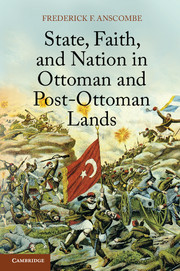Book contents
Conclusion - State, Faith, and Nation
Published online by Cambridge University Press: 05 June 2014
Summary
Politics is reactive. Throughout the turbulent history of Ottoman and post-Ottoman lands over the past 250 years, violence and disorder have resulted from regimes’ perceptions of their own weakness when facing a threat to their own existence. Government actions in response to such weakness have, in turn, triggered occasionally strong reactions from the populations over which they have had nominal or acknowledged authority. The nature of such reactions has been influenced by the perception of communal life dominant within each society, and the degree of violence in the reaction has tended to grow as the ideas framing such perceptions have themselves appeared threatened. That this pattern will continue over the next few years or decades seems all too probable.
Within this pattern of turbulence, the transition from Ottoman to post-Ottoman states generated a significant change in the nature of the perils facing regimes and in the popular responses to governmental actions. In the Ottoman period both the state and the majority of society perceived an urgent, existential threat to the empire because of its status as “The Abode of Islam”; in this sense, the sultanate and its most important subjects benefited from basic consensus on the nature of the threat, which proved a great advantage in comparison to the plight of most post-Ottoman countries, where new states lacked any point of real agreement with “the people.” For the Ottomans, consensus meant that the main story line of political development in the empire’s last century was one of balancing the regime’s need to strengthen itself to ward off Christian Europe with maintenance of the limits upon its domestic freedom of action placed by identification with Islam. As long as the imperial authorities could be seen to uphold religiously grounded principles of law and justice, they did not have to divert extraordinary resources to coercing loyalty. For post-Ottoman countries, the story line of historical development has expanded to include not only the search for strength against possible foreign foes but also the struggle against domestic threats, of which the lack of meaningful connection to the population has been the most serious and enduring. Of these threats, there is little doubt about which was the most serious: as creations of the great powers, none faced any real threat of attack.
- Type
- Chapter
- Information
- State, Faith, and Nation in Ottoman and Post-Ottoman Lands , pp. 292 - 296Publisher: Cambridge University PressPrint publication year: 2014

